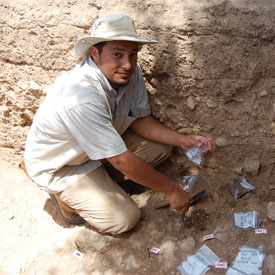October 2: Isaac Ullah, “Computational Modeling, Archaeology, and the Anthropocene”
Tuesday, October 2, 3:10 pm
Center for Digital Humanities, 344 Buttrick Hall
Isaac Ullah, “Computational Modeling, Archaeology, and the Anthropocene”
The concept of the “Anthropocene” derives from recent consensus among earth scientists that Earth-System dynamics have been become inordinately affected by human activities over time. Although a more recent onset of the Anthropocene is espoused by some (e.g., the mid-20th century “Great Acceleration” identified by Steffen et al. 2014), archaeologists have argued for much earlier beginnings – perhaps as early as 10,000 years ago with the advent of plant and animal domestication. Simulation modeling is becoming central to examining the spatio-temporal dynamics of Anthropocene processes. Further, the long-term historical interests of archaeologists in human-environmental interaction puts archaeologists in a unique position to contribute to this research.
Dr. Ullah will discuss a computational archaeology approach that takes the perspective that the Anthropocene is the accumulated physical record of ancient “Social-Ecological Systems” (SES). He will discuss how we can build, test, and use simulation models from archaeological data, and will showcase a suite of new modeling validation techniques that can help us connect simulation results to the physical proxy record of past human land-use to help us verify model output. These new techniques are expandable and, ultimately, should help us to more fully understand the dynamics of SES in the Anthropocene.
 Dr. Isaac Ullah is a computational archaeologist who employs GIS and simulation modeling to understand the long-term dynamics of humans and the Earth System. Dr. Ullah is particularly interested in the social and environmental changes surrounding the advent of farming and animal husbandry. His focus is on Mediterranean and other semi-arid landscapes, and he conducts fieldwork in Jordan, Italy, and Kazakhstan. His field work includes survey for and excavation of early agricultural sites as well as geoarchaeological analyses of anthropogenic landscapes. His specialties include landscape evolution, complex adaptive systems science, computational methods, geospatial analysis, and imagery analysis.
Dr. Isaac Ullah is a computational archaeologist who employs GIS and simulation modeling to understand the long-term dynamics of humans and the Earth System. Dr. Ullah is particularly interested in the social and environmental changes surrounding the advent of farming and animal husbandry. His focus is on Mediterranean and other semi-arid landscapes, and he conducts fieldwork in Jordan, Italy, and Kazakhstan. His field work includes survey for and excavation of early agricultural sites as well as geoarchaeological analyses of anthropogenic landscapes. His specialties include landscape evolution, complex adaptive systems science, computational methods, geospatial analysis, and imagery analysis.
Dr. Ullah’s visit is co-sponsored by EES, the Program in Environmental and Sustainability Studies, the Program in Classical and Mediterranean Studies, the Department of Anthropology, and the Department of History of Art.